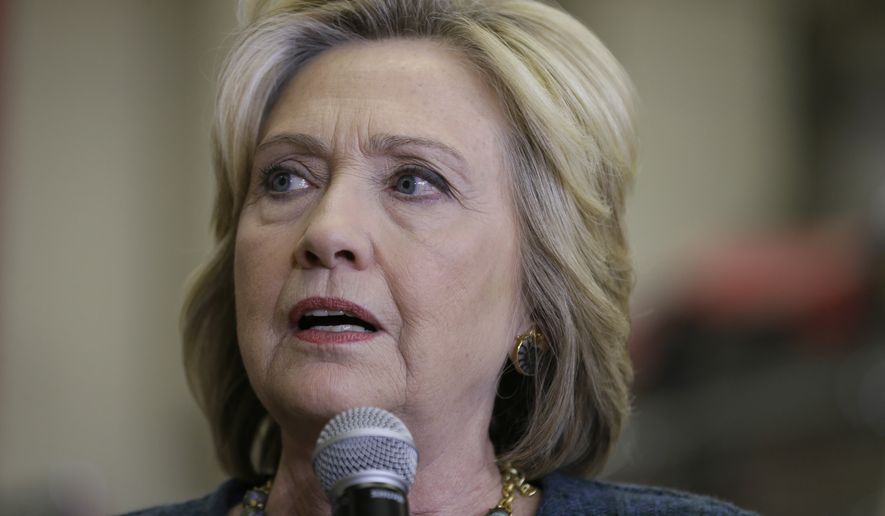Secretary of State Hillary Clinton’s top aides knew about her secret email account but allowed the department to mislead the public about its existence, an inspector general said in a report Thursday that found widespread problems with transparency during Mrs. Clinton’s tenure.
The department told a public interest group in 2013 that there was no information on Mrs. Clinton using a non-State.gov email account — even though dozens of her top staffers knew she used an account kept on a server she maintained at her home in New York.
Mrs. Clinton’s chief of staff, Cheryl D. Mills, was even told of the request, but the department gave an erroneous answer anyway, the inspector general said.
The report was issued just hours before the department, prodded by a court order, released thousands more of those emails, making up for missing a Dec. 31 deadline.
Mrs. Clinton’s email arrangement has proved an embarrassment both for her and for President Obama, her political opponent in 2008 who then became her boss in 2009 after he tapped her to be his top diplomat.
The State Department under her successor, Secretary John F. Kerry, has insisted it’s cleaning up operations and trying to do a better job of responding to requests.
But the inspector general said even as the number of requests skyrocketed, the department cut funding for the division responsible for handling the requests — adding to what seemed to outsiders to be a veil of secrecy surrounding Mrs. Clinton’s activities at the department.
Indeed, the department is four times worse than the average government agency in terms of how long it takes to fulfill a document request under the Freedom of Information Act, the inspector general said.
And even though Mrs. Clinton left office three years ago, some 177 requests relating to her are still pending, while just 63 have been closed.
Worse yet, the department regularly misled the public by giving false information about Mrs. Clinton’s emails or, in one case, spent “several years” ignoring a request from The Associated Press seeking Mrs. Clinton’s daily schedules.
When asked specifically if Mrs. Clinton was using a non-State.gov email account, the department also gave a false answer, the inspector general said.
Citizens for Responsibility and Ethics in Washington, a watchdog group, had sought the information, pointing to other top Obama administration officials who’d used secret email accounts to conduct government business.
CREW filed its request in December 2012, just before Mrs. Clinton left office, and the department responded in May 2013 that it had “no records” responsive to the request — even though Mrs. Clinton emailed thousands of messages to other department employees from her account, and all of those records should have been available.
“Dozens of senior officials throughout the Department, including members of Secretary Clinton’s immediate staff, exchanged emails with the Secretary using the personal accounts she used to conduct official business,” the investigation concluded. “OIG found evidence that the Secretary’s then-Chief of Staff was informed of the request at the time it was received and subsequently tasked staff to follow up. However, OIG found no evidence to indicate that any of these senior officials reviewed the search results or approved the response to CREW.”
Democrats acknowledged the problems. But Sen. Patrick J. Leahy of Vermont, ranking Democrat on the Judiciary Committee, said the issues “have existed for decades, spanning Democratic and Republican administrations.”
Mr. Leahy warned Republicans against “just playing political games with the report.”
But Republicans said the breakdown seemed to have been particularly acute during Mrs. Clinton’s time in office — a time that has come under intense scrutiny given her presidential bid.
Sen. Chuck Grassley of Iowa, chairman of the Senate Committee on the Judiciary, said the breakdown was so bad that the government ended up making false sworn statements in court — and didn’t correct them, even though Mrs. Clinton’s top aides knew they were erroneous.
“In light of this report, the department should explain to the courts and to the public why those inaccurate declarations were filed,” Mr. Grassley said.
Judicial Watch, a public interest law firm that has battled to get a look at Mrs. Clinton’s emails, said it would submit the inspector general’s report to several federal judges in Washington, D.C., who are looking into the department’s botched handling of open records requests.
One of those, Judge Rudolph Contreras, issued the order demanding the State Department release all of Mrs. Clinton’s emails on a rolling monthly basis.
Thursday’s release was part of that. The emails were to have been part of the Dec. 31 release, but the State Department missed Judge Contreras’ deadline. The department cited the bustle of the holiday season for its lapse.
A final set of emails — nearly one-fifth of the more than 30,000 messages she belatedly turned over — is due to be released Jan. 29.
• Stephen Dinan can be reached at sdinan@washingtontimes.com.




Please read our comment policy before commenting.